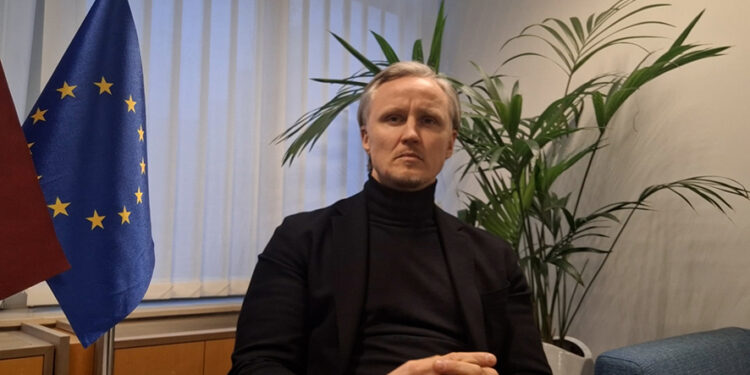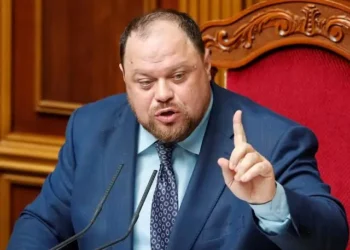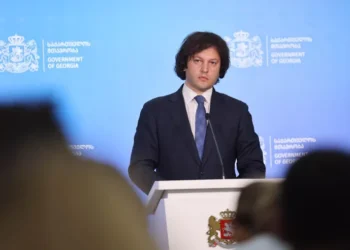I call on European national parliaments to invite President Zurabishvili to address them and expose what the regime is still doing. It’s no longer about the so-called Russian foreign agent law. It’s way beyond that. And, of course, they continue to play this double game—saying, ‘Yes, we’re ready for dialogue,’ while accusing others of being paid from elsewhere. I’ve been accused by someone saying, ‘We will eventually find out who’s paying you.’ Well, actually, it’s European taxpayers who are paying my salary, and I’m very grateful for that. I carry out my duties according to the promises I made to them. And that’s also a promise to my voters—to engage with the aspirant countries and bring them closer to European integration. It is my duty to fight for a cause that aligns with the aspirations of the Georgian people as well – Rihards Kols, a member of the European Conservatives and Reformists Group and a Latvian MEP, tells Radio Free Europe’s Georgian Service. A fierce critic of what he describes as “The Georgian Nightmare regime,” Kols is one of the most active Western politicians when it comes to preventing international visits to Georgia that might help legitimize the government of the Georgian Dream. This was the case with the planned and subsequently scrapped visit of the OSCE Parliamentary Assembly President Pia Kauma. Rihards Kols spoke to Vazha Tavberidze in Brussels.
The OSCE PA President Pia Kauma saga – you were the first to raise the alarm about her visit, and then she cancelled it. Do you think others will take notice now?
They have to. Pia Kauma received a clear message that the Finnish Foreign Ministry’s position is opposite to hers. She’s a Finnish politician, a member of the ruling coalition in Finland, and her actions contradicted Finland’s official stance. Some might argue that when someone becomes the head of an institution, they should be impartial and neutral. But when there is a gross violation of fundamental rights, you cannot remain neutral. Doing so would make you complicit in a crime. Therefore, the moral stance should be to not engage with the Georgian regime — or the ‘Georgian Nightmare,’ as it’s aptly been nicknamed — that is currently running the country. Yes, this kind of pressure works on politicians because it’s about their image; they care about how they’re perceived back home. I don’t think they care much about how they’re seen in Latvia or Georgia, but they do care about their reputation at home. So, I believe it was the right move to call her out publicly.
Pia Kauma received a clear message that the Finnish Foreign Ministry’s position is opposite to hers
In an interview with us, Kauma said that no external actor should be giving legitimacy to the government, and that it’s a purely domestic issue. GD had a field day with that, portraying international criticism and the increasingly real possibility of non-recognition as an attack on Georgia’s sovereignty. What’s your view?
I’ll put it very simply: it’s bad when leadership in these important institutions is weak, because weak leadership makes for tough times. What the OSCE PA needs is strong leadership that doesn’t compromise the organization’s principles. I’d love to ask Pia Kauma: Are the elections in Russia legitimate? Are the elections in Belarus legitimate? So don’t feed me that nonsense, please! What I’ve been noticing more and more in these key institutions is that we have conformists in high positions, not people who are safeguarding the integrity and principles of the organization. Instead, they view it as a convenient position. The OSCE has status and reputation. I’m a big person with a big chair, but I care less about the organization. This is what really makes me sick to my stomach when I see things like this.
How long do you think this diplomatic limbo can go on for? What will the consequences be?
I don’t think it’s a diplomatic limbo anymore. We see that the US has imposed sanctions on the main actor, the one who’s actually pulling the strings. I support what the US has already done and what the US Helsinki Commission is pushing for, and I would like to see the same kind of action from the European member states. The European Parliament, in our own capacity, has already adopted a resolution where we do not recognize the election results.
In these key institutions, we have conformists in high positions, not people who are safeguarding the integrity and principles of the organization
What about the big European capitals? Who will they be shaking hands with in three months’ time, do you think? Georgian Dream or the opposition?
Well, thank God that right now, the EU Presidency is with Poland. We’ve already seen what Poland is going to do, as they have withdrawn their invitation to the ‘Georgian Nightmare’ from the COSAC (Conference of Parliamentary Committees for Union Affairs of Parliaments of the European Union) conference in Warsaw this month. This is a testament that whatever happens in Georgia won’t be overlooked; instead, it will stay on the agenda and will rise higher and higher. Next week, there will be a plenary session of the European Parliament. I wouldn’t rule out the possibility of another resolution being submitted, calling for the European Commission and the Council to take concrete action, not just offer rhetoric. That will be another litmus test for where Europeans stand, how firm they are, and who is willing to undermine the situation by saying, “For the sake of dialogue or whatever, let’s engage with the Georgian regime.”
I would rather see more decisive action, but the EU is a complex entity. Any sanction is a process that takes time
The EU officials are set to approve cancelling of visa liberalization for diplomatic passports, but this means they can still travel and enjoy the liberalization with their regular passports. It seems more a slap on the wrist than actual sanctions.
It’s not entirely true to paint it like that. Of course, I would rather see more decisive action, but again, the European Union is a complex entity. Any sanction is a process that takes time. I wish that weren’t the case. Just as an example, when it comes to Russia’s aggression in Ukraine, we are now talking about 15 packages of sanctions – all of that should have been in one. On the other hand, nobody has excluded national sanctions, and national sanctions can also impact Schengen visas. So that is another layer of pressure as well. If someone is backing the ‘Georgian Nightmare,’ we can say, after the EU sanctions, we’ll issue our own national sanctions as a bonus, and that’s it.
Interview by Vazha Tavberidze














